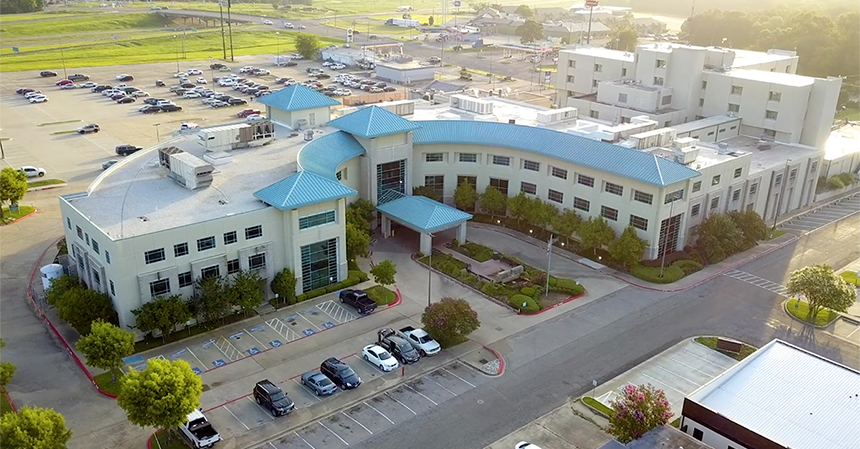HSC partnership with rural Texas hospital boosts health literacy and cultural humility
By Alex Branch
As Titus County grew into a COVID-19 hot spot last summer, Terry Scoggin realized the rural hospital he leads needed to make some big changes.
The east Texas county is 40 percent Hispanic — many drawn there by jobs in the manufacturing and food processing industry — but Titus Regional Medical Center lacked the ability to effectively communicate critical pandemic information to Spanish-speaking residents.
“All the information we put on our website was in English, we were short on bilingual staff and we didn’t have a good understanding of the cultural differences that impact access to health care,” said Scoggin, CEO of the Medical Center. “We just were not connecting.”
Seeking help, Scoggin called the Texas Organization of Rural and Community Hospitals, which referred him to The University of North Texas Health Science Center at Fort Worth (HSC) and its SaferCare Texas initiative. SaferCare has a team of interprofessional patient safety experts, one who focuses solely on helping health care providers communicate more effectively with patients.

One year later, Scoggin said, the collaboration with HSC and Dr. Teresa Wagner, Clinical Executive over Health Literacy for SaferCare, has laid the groundwork for Titus Regional Medical Center to transform how it interacts with patients.
“The more I talked to Dr. Wagner, I started to understand that our problem was not simply translating information into Spanish but a deeper health literacy problem,” Scoggin said. “It’s the same problem communities just like us everywhere are facing.”
Health literacy has historically been defined as an individual’s ability to find, understand, and use information and services to make informed health-related decisions. However, Healthy People 2030, an U.S. Office of Disease Prevention and Health Promotion initiative to develop 10-year national objectives to improve the health of all Americans, expanded the definition to hold healthcare organizations accountable for doing their part to help patients understand health information.
According to the American Medical Association, up to 90% of Americans may lack the knowledge and skills needed to manage their health and prevent disease. Nationally, this costs the healthcare system an estimated cost of over $230 billion a year in avoidable health care spending. People at higher risk of low health literacy, include the elderly, and individuals with lower socioeconomic status or lower English proficiency.
In September, Dr. Wagner secured a $78,000 grant from HSC to launch a comprehensive needs assessment in Titus County. She organized focus groups with people in the Hispanic and Latino community, and she hired and trained a community health worker who grew up in the area. She also leveraged the insight of one of the SaferCare Texas staff, Clara Ramirez, who grew up in the Titus County Hispanic community as her Project Coordinator.
“Improving health literacy requires relationship building,” Dr. Wagner said. “It’s an intentional decision to change the way you communicate and create a culture of trust, compassion and humility with your patients.”
For Scoggin, that meant considering how patients who don’t speak English feel having to bring their child to health appointments to translate and hear all of their health information. Or how overwhelming the hospital’s inventory of services can be without a patient navigator to guide someone who is unfamiliar with the American health care system.
It involved outreach and relationship building with community leaders and churches. That’s a strategy that worked during COVID-19 vaccinations when the Texas Tribune noted Titus County’s success with an approach “more tailored to this churchgoing, blue-collar community” rather than chain pharmacies or occasional vaccine events.
Scoggin said Titus County’s work isn’t over. The Medical Center plans to open a new clinic with two bilingual providers available for all patients in August. Other staff and providers will take a Spanish 101 course and health literacy training both developed by Wagner and Ramirez so they can communicate basic information to Spanish-speaking patients. The Medical Center will continue to reassess how it can better engage with all patients.
“We are still really in the beginning phases,” Scoggin said. “But our work with Dr. Wagner and HSC has helped us prepare a plan to make a big difference.”



![Uyen Sa Nguyen Scaled[58]](https://www.unthsc.edu/newsroom/wp-content/uploads/sites/16/Uyen-Sa-Nguyen-scaled58-145x175.jpg)


Social media